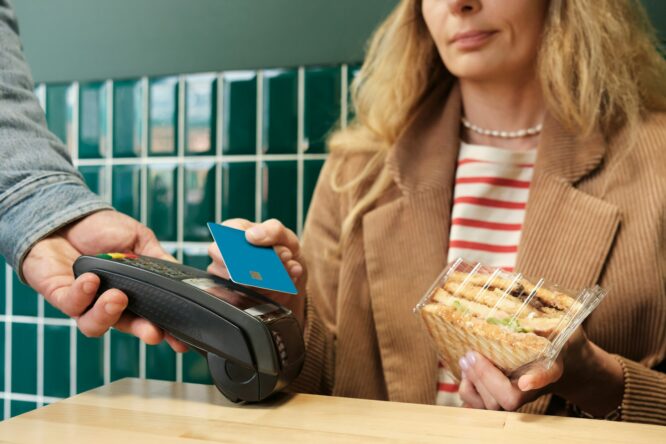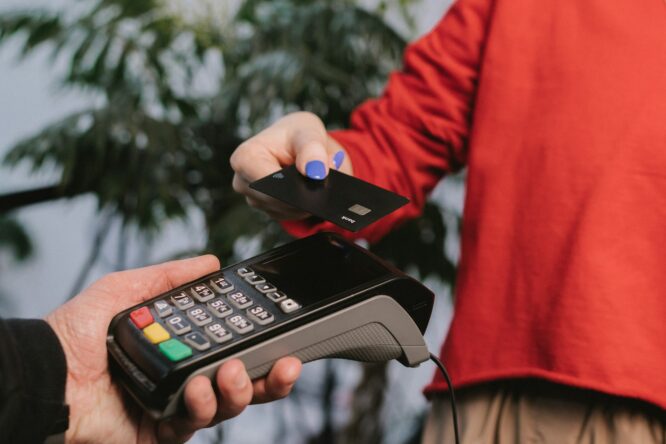Ever looked at your bank balance and thought, “Where did it my money go?”

You’re definitely not alone there. Being skint isn’t always about big disasters—it’s often the tiny habits that slowly but surely nibble away at your money without you even noticing it until you’re well into your overdraft. If your wallet feels permanently empty, no matter how much you earn, these sneaky habits might be worth a closer look.
1. You treat your debit card like a magic wand.

Tap to pay makes life dangerously easy. It’s effortless, it’s satisfying, and it’s also why you sometimes don’t feel the weight of how much you’re actually spending. The money leaves your account quietly, with none of the emotional punch of handing over cold, hard cash. Before you know it, those small taps add up to a terrifying sum at the end of the month. If you’re rarely checking your balance and just trusting the magic card to keep working, you might be bleeding money without meaning to.
2. You confuse “I deserve it” with “I can afford it.”

After a tough week, treating yourself feels justified, and sometimes it absolutely is. Of course, when “I deserve it” becomes a daily excuse for impulse spending, your bank account starts quietly waving a white flag in the background. Deserving something and being able to afford it are two very different things. If you’re constantly mixing them up, it’s no wonder payday feels like a pit stop rather than a reward.
3. You underestimate “little” purchases.

It’s just a coffee. Just a takeaway. Just a quick £20 splurge online. None of them feel like big deals individually—but when you stack them all up, they start to look suspiciously like rent money. It doesn’t mean you can never have fun. It’s just about remembering that the little leaks often sink the ship faster than one big splurge. Keeping an eye on the small stuff can make a massive difference in the long run.
4. You shop to fix your mood.

Retail therapy has its moments, but if your go-to move for sadness, boredom, or stress is hitting “add to cart,” your bank account is going to suffer for it. Shopping feels good in the moment, and then it feels absolutely dreadful later. If you find yourself constantly buying little things to scratch an emotional itch, it might be worth asking what you’re really trying to soothe. Spoiler: it probably isn’t a lack of new shoes.
5. You don’t actually know your monthly costs.

Lots of people vaguely guess what their bills add up to, and lots of people are way off. If you’re not brutally clear on what’s going out every month, it’s almost impossible to feel in control of what’s left over. Knowing your real numbers isn’t boring adulting—it’s basic survival. Once you know where your money actually goes, it becomes way easier to stop it from leaking out of your life unnoticed.
6. You tell yourself that future you will handle it.

“I’ll deal with it next month” sounds harmless… until you say it every month for a year. Delaying hard money conversations with yourself is comforting short-term, but brutal long-term. Future you deserves better than being dumped with a financial mess you could have started fixing today. Even one small step now is better than leaving it all for some magical “later” that never quite arrives.
7. You sign up for free trials and forget about them.

Streaming services, fitness apps, monthly mystery boxes—they all count on you forgetting to cancel. £7 here, £12 there, and suddenly half your monthly budget is going to subscriptions you don’t even use. It’s not the subscriptions themselves that are the problem—it’s the ones silently draining your account without adding any real value to your life. Check your statements. You might be shocked at what’s still quietly ticking away.
8. You buy cheap instead of buying smart.

It feels savvy in the moment to grab the cheapest option, but when you have to replace it two months later, it’s not such a bargain. Sometimes spending a little more upfront saves you a fortune over time. Cheap costs more when it keeps breaking, wearing out, or not doing the job properly. Thinking long-term, even for small things, can quietly transform how much you’re bleeding money without realising it.
9. You treat sales like emergencies.

“70% OFF!” flashes across your screen and suddenly, you’re convinced you need three coats and a juicer you’ve never once considered owning. Sales create fake urgency, and if you’re not careful, they trick you into spending on stuff you never even wanted. Just because something’s a good deal doesn’t mean it belongs in your life. Real saving means buying less, not buying more because the price tag got a little shinier.
10. You don’t set spending limits, only budgets.

Budgeting is great in theory, but if you’re not setting personal daily or weekly limits too, it’s easy to blow through your plans because “technically” you haven’t gone over yet. It’s a bit like dieting by saying “I’ll eat healthy… eventually.” Spending limits create real-time friction that makes you stop and think. They help turn big, vague financial goals into something you can actually manage day-to-day without feeling overwhelmed.
11. You avoid looking at your balance altogether.

Sometimes staying skint isn’t about overspending—it’s about flying blind. Avoiding your bank account feels easier than facing it, but it keeps you stuck in the same cycle where money controls you instead of the other way around. Looking doesn’t make the numbers worse. It just gives you the power to actually change them. Even if it’s uncomfortable at first, that honesty builds real freedom in the long run.
12. You believe saving is something you’ll start “when you earn more.”

It’s a tempting trap—telling yourself that savings, investments, or even emergency funds can wait until you’re “making real money.” But if saving isn’t a habit now, it won’t magically become one later either. Starting small, even embarrassingly small, proves to yourself that you can do it. Waiting for some perfect future moment just keeps you stuck living pay cheque to pay cheque, no matter how big the pay cheque eventually gets.




